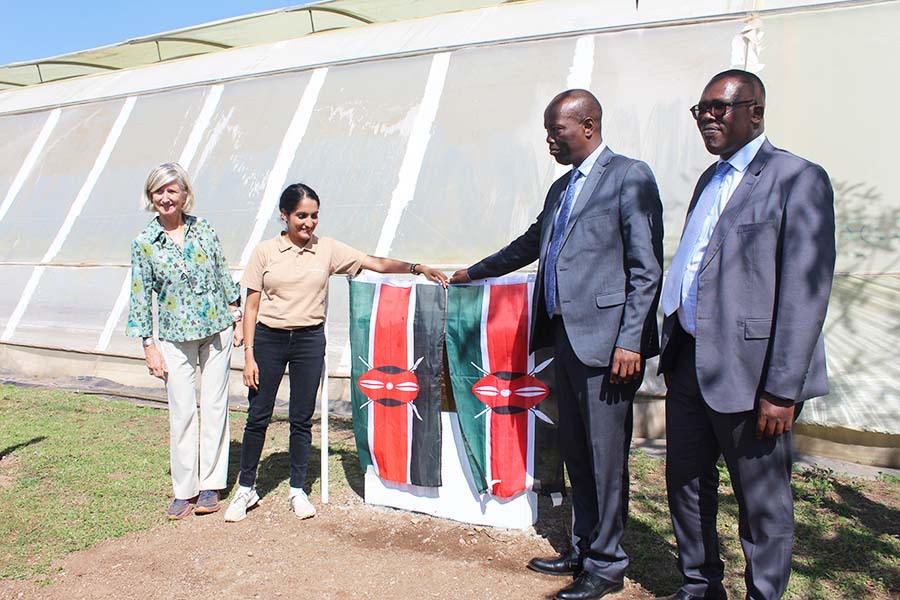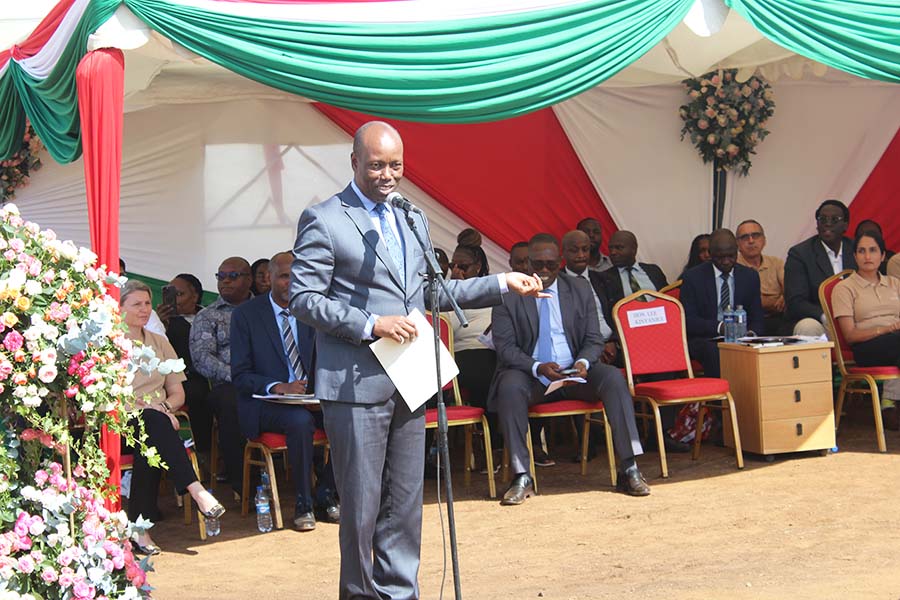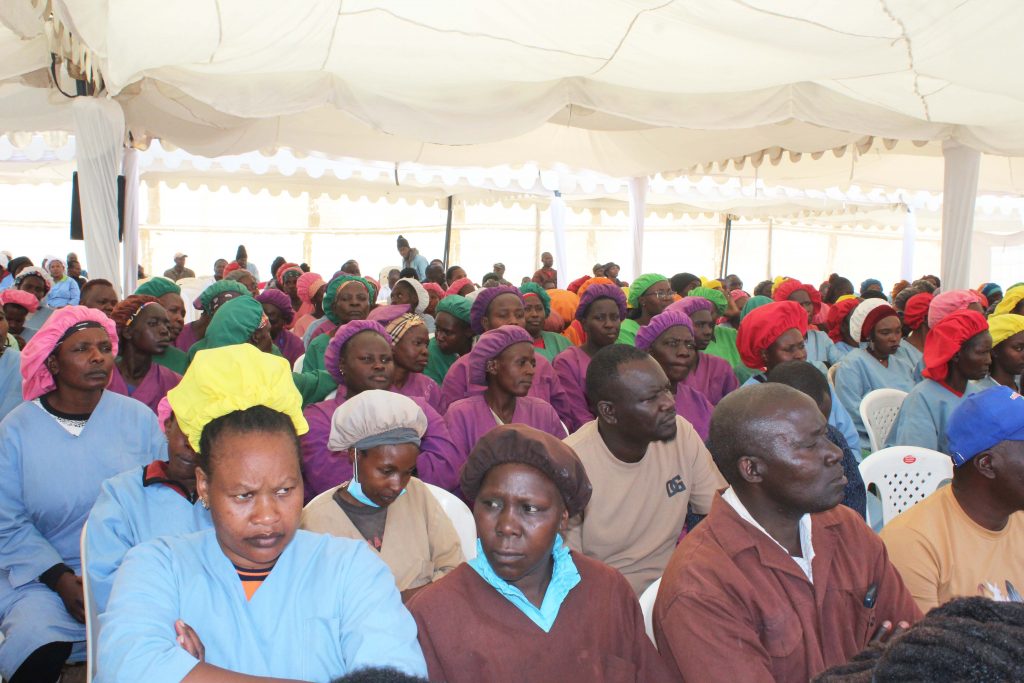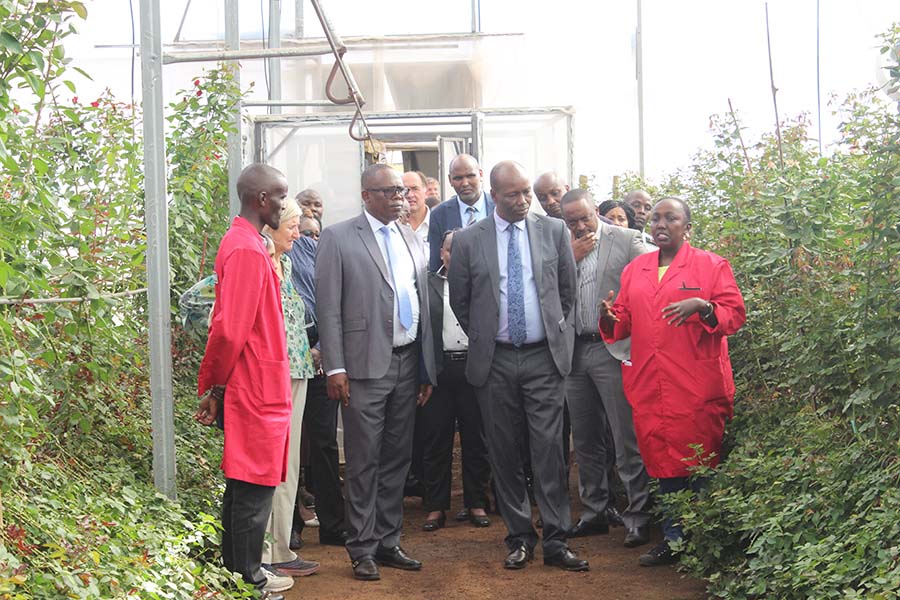Bʏ Mᴀʀʏ Mᴡᴇɴᴅᴇ
October 16, 2025

Red Lands Roses marked a transformative milestone this week, officially celebrating its transition into a Special Economic Zone (SEZ). Founded in 1996, Red Lands Roses SEZ PLC is a premier grower and exporter of luxury spray roses, supplying high-end markets worldwide. The event, held at their Ruiru farm in Kiambu County, brought together senior government officials, industry leaders, and stakeholders from across the floriculture value chain to witness what was hailed as a major leap forward for Kenya’s fresh produce.
Themed “Transition of Red Lands Roses into SEZ and the Floriculture Industry in Kenya,” the event highlighted the tangible gains made under the SEZ framework; from new investments and infrastructure upgrades to job creation and sustainability leadership.
For a farm long known for its precision, sustainability, and world-class spray roses, the transition into a Special Economic Zone depicts Kenya’s growing capacity to integrate modern industrial policy with agricultural excellence.
“Our journey to becoming an SEZ started in 2020,” explained Disha Copreaux, the CEO of Red Lands Roses. “It was grounded in a very clear decision: to align our growth with Kenya’s long-term industrial development agenda.”
Red Lands Roses was officially gazetted as a Special Economic Zone in August 2022, and over the past years, it has successfully implemented the SEZ model in full compliance with national regulations. The transformation, according to Ms. Disha, was guided by three main goals: expanding operations in an increasingly urbanized region, attracting foreign direct investment, and creating long-term, quality employment for local residents.

Since achieving SEZ status, the company has invested €7.5 million in infrastructure and technology. It has built modern greenhouses fitted with sustainable hydroponic systems, expanded its solar energy capacity, and grown its farm from 28 to 44 hectares.
These developments have driven exponential growth. Red Lands Roses now employs over 1,000 people, up from 450 just three years ago. This expansion has had a multiplier effect across the local economy, benefiting suppliers, packaging companies, transporters, and service providers linked to the farm’s operations.
Beyond the numbers, Red Lands Roses continues to distinguish itself through a strong focus on employee welfare. The company provides private medical insurance, school fee subsidies, subsidized meals, and even bicycles for staff transport; benefits that have made it one of the most progressive employers in Kenya’s flower sector.
“Our employees are the backbone of this company,” said Ms. Disha. “As the farm grows, so do the people who make it thrive.”
She emphasized that SEZ incentives have allowed Red Lands Roses to reinvest more in its people, its infrastructure, and its sustainability programs. “We wanted to create inclusive growth opportunities that uplift our community and contribute to Kenya’s Vision 2030,” she added.
Chief Guest Hon. Lee Kinyanjui, Cabinet Secretary for Investments, Trade and Industry (MITI), commended Red Lands Roses for pioneering the SEZ model in the floriculture sector and demonstrating its potential as a tool for national economic transformation.
“The role of investors like Red Lands Roses in our economy cannot be overstated,” CS Kinyanjui said. “This farm alone supports more than 1,000 people directly, and when you consider that each worker supports an average of three or four dependents, it means over 4,000 lives are being touched right here in Ruiru. That’s the power of enterprise.”
The CS noted that Kenya’s SEZ policy was designed to solve long-standing challenges that have hindered exporters, including delays in VAT refunds, high logistical costs, and unpredictable tax regimes. He described Red Lands Roses’ transition as a “long-term, sustainable solution” to these issues.
“The SEZ model provides a predictable environment that promotes reinvestment and growth,” he said. “It’s exactly the kind of framework we need to expand Kenya’s export capacity and attract new investors into value-added production.”

Kinyanjui also announced that the government has made significant progress in expanding air cargo capacity to accommodate more horticultural exports, a major concern for perishable goods like flowers and vegetables. “We now have increased cargo capacity, and in the coming months, we expect to reach surplus levels,” he said, urging investors to seize the opportunity to expand operations.
He further cited declining interest rates, now averaging around 12–13%, as another enabler of business growth. “With more affordable credit, companies can borrow, expand and improve cash flow, key ingredients for a thriving industrial sector,” he said.
A pioneer in environmental responsibility, Red Lands Roses has long been recognized for its eco-conscious farming systems. The farm operates a closed-loop hydroponic system that recycles water and nutrients, preventing leaching into groundwater. Its solar plant supplies roughly a quarter of its total power needs, significantly reducing its carbon footprint.
The farm’s sustainability credentials are internationally recognized. It holds certifications from UN Climate Neutral Now, One Carbon World, MPS, and the Kenya Flower Council, placing it among the top-tier eco-certified producers globally.
“We’ve stayed true to our mission of sustainable farming,” Ms. Disha said. “For us, sustainability is not an add-on, it’s built into every decision we make.” Kenya remains the dominant flower exporter on the African continent, accounting for nearly 40% of Europe’s imported roses. CS Kinyanjui reaffirmed that the sector’s competitiveness stems from Kenya’s skilled workforce, favourable climate, and growing capacity for innovation and value addition.
“Kenya has no peers in floriculture,” he said proudly. “We’re building not just farms, but institutions that can support value addition right here at home, from packaging to bouquet processing, ensuring that a bigger share of the global flower value stays in Kenya.”
He added that the government, in partnership with agencies such as KRA and the Special Economic Zones Authority, is reviewing taxation frameworks to ensure they spur rather than stifle growth. “Tax policy should be an instrument for economic expansion,” he said. “We’re committed to ensuring that every regulation encourages investment and productivity.”

As one of the first flower farms to operationalize as a Special Economic Zone, Red Lands Roses is already helping chart the path for others in the sector. “We’re happy to share our experience with other growers who want to make the transition,” said Ms. Disha. She emphasized that the next phase for the company will focus on stabilizing operations, deepening community engagement, and expanding employment opportunities within the sector. Through partnerships with the Kenya Flower Council, Red Lands Roses aims to strengthen Kenya’s position as a global leader in sustainable floriculture.
“Kenya’s greatest comparative advantage is its people; their resilience, ingenuity, and spirit of collaboration,” Ms. Disha noted. “We’re deeply honoured to play a small part in that national story.”
Dr. Kenneth Chelule, CEO of the Special Economic Zones Authority (SEZA), also in attendance, congratulated Red Lands Roses for setting a national benchmark in sustainable investment and compliance. He praised the company’s commitment to Kenya’s SEZ policy. “You’ve not just invested, you’ve been compliant, created jobs, and built exports,” he said. Chelule emphasized that the SEZ program was designed to provide a stable and competitive environment that could retain investors who might otherwise look to markets such as Ethiopia or Asia. “Red Lands Roses stands as a perfect candidate for investment in this country,” he remarked, urging the company to continue leading the sector “from bronze to gold” as Kenya strengthens its position in the global $41 billion flower market.
Speaking on behalf of the Agricultural Employers Association (AEA), CEO Wesley Siele commended Red Lands Roses for their integrity and transparency throughout the SEZ transition.
He noted that the company had kept its entire workforce informed at every stage and upheld all collective bargaining agreement (CBA) obligations, a clear demonstration that progress and compliance can coexist. “Red Lands Roses has consistently shown what it means to grow responsibly, combining operational excellence with genuine care for its people,” said Siele.
He praised the farm for setting a benchmark in employee welfare within Kenya’s agricultural sector, adding that it stands as “a model of how business transformation, when guided by values, can uplift both companies and communities.”
Deputy Commissioner for Policy and International Affairs, Kenya Revenue Authority (KRA), Mr. David Ontweka congratulated Red Lands Roses on behalf of Commissioner Dr. Lilian Nyawanda, lauding the company’s milestone as a testament to Kenya’s vision for a compliant, sustainable, and export-driven economy. He emphasized that Special Economic Zones are “the engines of our national economic strategy, catalysts for investment, hubs of innovation, and creators of vital jobs.” Ontweka outlined KRA’s role as both a regulator and strategic partner, highlighting the agency’s efforts to streamline onboarding, digitize customs processes, and foster cooperative compliance. “KRA is not just a regulator; we are a strategic enabler for your growth,” he said, pledging continued collaboration with SEZ operators to refine systems, enhance automation, and build investor trust.
Issabelle and Aldrick Spindler, the founders of Redlands Roses, among other dignitaries, also graced the occasion.
